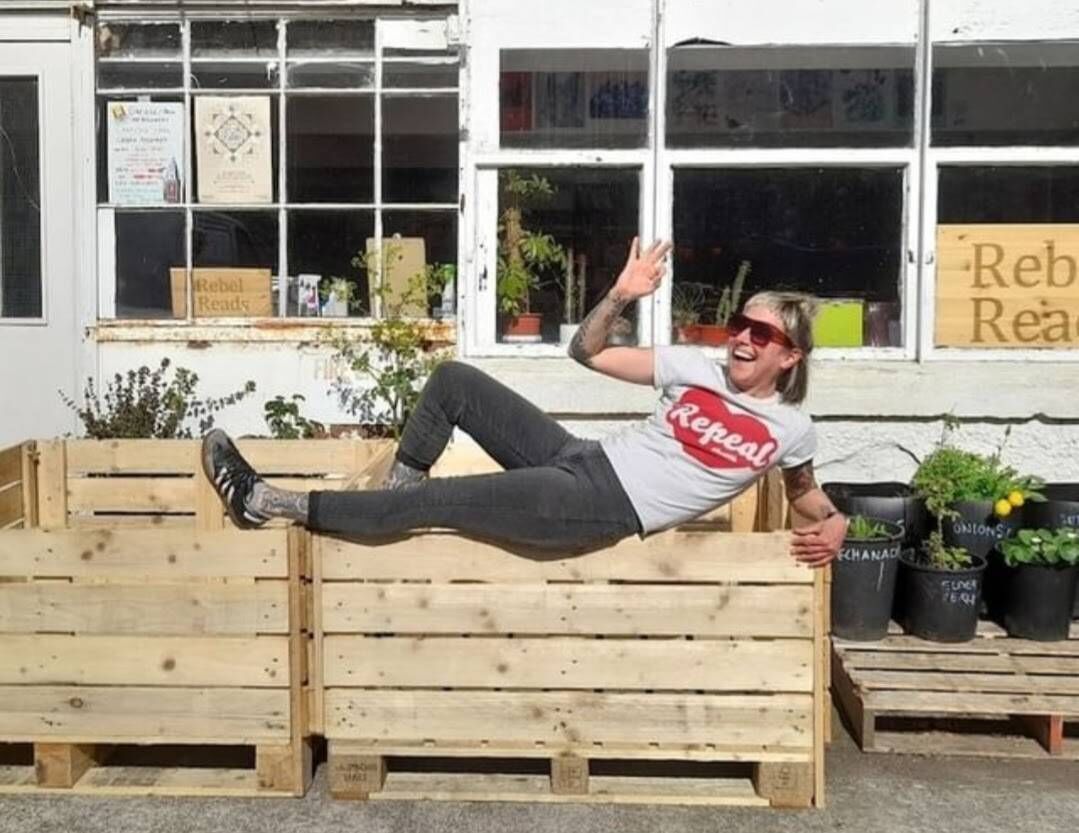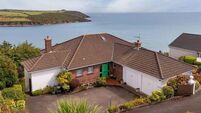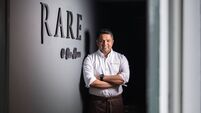Success of Cork food waste-to-soil project inspires the nation...

Virginia O'Gara with compost from the aerobic biodigester going straight into the beds.
THE innovative Cork Urban Soil Project, or CUSP, was this year’s recipient of the prestigious Irish Food Writers’ Guild Community Food Award.
It came hot on the heels of another national recognition in November, 2023, when the project was named as Innovator of the Year at the Food & Wine Awards, and also featured on RTÉ programmes Nationwide and Food Matters.
CUSP is a project that takes would-be food waste and turns it into compost used to grow more food, known as a closed-loop system.
It’s run by a collective of people made up of Virginia O’Gara of the My Goodness food company, food creative Molly Garvey, human-rights activist Sean Binder, and project manager Erin O’Brien. Its supporters include Cork City Council, MTU, the Local Enterprise Office, and Cork Environmental Forum.
The project sprang from an initial experiment at the Body & Soul music festival in 2017, called Food on Board, where food waste from festival vendors was turned into compost during the weekend.

It flipped a switch for Virginia O’Gara, a Food on Board participant and My Goodness co-founder, who headed back to Cork with the idea for a larger scale, community-based project.
In 2018, CUSP was established, and in 2022 a funding request from the Circular Economy Innovation Grant was successful. The project collaborated with MTU, who provided an essential piece of equipment, a second-hand biodigester, and lab tested the compost it created to see how nutrient dense it was for growing vegetables - because healthy soil means healthy food.
CUSP HQ is located at the Marina Commercial Park in the city. It’s a sprawling industrial complex, a built environment of concrete and not much else. There is little natural life going on here, yet amongst the grey, a pocket of vibrant biodiversity has emerged, outside the My Goodness commercial kitchen and beside Rebel Reads bookshop.
Last year alone, the CUSP project took 20 tonnes of food waste from My Goodness’ commercial kitchen, coffee grinds from a nearby coffee shop, spent botanicals from Rebel City Distillery, and unused beer mats from the Franciscan Well Brewery otherwise destined for landfill or incineration and converted it into ten tonnes of compost.
From that compost grew garlic, salad leaves, peas, beans, cabbages, purple sprouting broccoli, tomatoes, herbs and more, which went back into the commercial kitchen to create more food, the waste from that returned to the biodigester to create more new compost.
In addition to diverting food waste and creating compost, there have been other benefits. Compost acts like a sponge, soaking up excess rainwater and reducing potential for flooding, and the modular planters built for growing vegetables created pollinator corridors for beneficial insects and proved a draw for other people working in the industrial estate.

But CUSP also grew a community of people from across Cork enthralled and inspired with the vision of what the project could achieve.
I caught up with Virgnia O’Gara and Molly Garvey to ask them how they feel about their project gaining national acclaim, and what’s next for CUSP.
“It’s a great honour to be recognised on a national and local level,” says Virginia.
When we started this project, we knew we weren’t experts, but we were feeling a collective anxiety about common issues like how to deal with food waste and how to create a circular waste system.
"These are all problems My Goodness were trying to address as a company and as a community that cares about the environment.”
“We quickly realised our project, although small and humble, was being watched by people around the nation because we all have the same issue: we create waste so how can we deal with it in a better way? If we can begin to focus on the waste we have to deal with ourselves, the knock-on effect is we start to pay attention to the waste being producing and start eliminating at the source,” says Virginia.
“Another beneficial product is this incredible compost being produced right in the heart of Cork city. It can be used to combat flooding, grow more vegetables, create pollinator corridors in the city, and to start growing more food in places where people live and strengthening urban food sovereignty.”
Compost is a magical substance in what it can provide. Not just food, but habitat, community, and a valuable resource for capturing everything from carbon to excess flood water.
Making compost requires two inputs: green and brown waste. Green waste came from food scraps from My Goodness’ kitchen. As a raw vegan food company, the green waste is almost entirely vegetable based, and there was plenty of it. But getting the right amount of brown waste proved tricker, and for that they looked to other businesses in the industrial park.

“When you’re looking at the circular system, you need to map the streams and flows of where you are; what type of material is moving in the area, who’s producing waste and whose resource can that waste be. Industrial parks are ripe for this kind of connection,” explains Molly.
What they found were coffee grinds from Cortado and Mahers coffee houses, spent botanicals from Rebel City Distillery, and unused excess beer mats from Franciscan Well Brewery.
“The collaborations came after our assessment of where we are, rather than us saying we want to work with Rebel City Distillery, etc. It was more about knowing what our needs are, who in the area has high carbon or nitrogen products, and how much of a burden are those products for them because they pay for their waste to be removed.”
The benefit then becomes four-fold: CUSP gets free raw materials, businesses save money on waste disposal costs, nutritious soil is generated, and more food is grown.
“What if managers of industrial parks intentionally accepted applications from organisations based on what their possible waste streams would be and matched them to current needs of businesses already in the park? That would be interesting – it would be like online dating for resources!” says Molly.
It’s also a great excuse to talk more with your commercial neighbours. Strong relationships are formed when there is a shared activity, and ‘Trash Talk’ is a great community builder!
CUSP does carry a warm glow about it everywhere it goes, and like a beacon it has attracted interest from all kinds of organisations across the country.
The television coverage and awards from Cork Environmental Forum, Food & Wine Magazine and the Irish Food Writers’ Guild, says Virgina, attracted the attention of people who can make a difference.
“We have had people who organise the mess kitchens in the Defence Forces who saw the show and want to set up a similar system to CUSP. Dromoland Castle, a high-end hotel and restaurant, bought a biodigester machine three times the size of ours after watching us on Food Matters. The HSE in Sligo have established a biodigester, and another urban soil project has been set up in Lusk by someone who saw the show and was inspired to set up their own project.

“The beauty of CUSP is that we’re not experts,” says Virginia. “We’re willing to do the work, mess up, collect the data and tell everyone about it. And because it’s such a simple project run by normal people, if we can do it, anyone can!”
The CUSP final report shows it has been a success. A substantial amount of would-be food waste has been diverted from landfill, compost has been created that is nutritious enough to grow more food, and potential sources of waste have been mapped and collaborative relationships established.
But the analysis showed that there was no net financial benefit to the project, and at a time when the commercial reality for so many is focused on the bottom line, how easy will it be to attain buy-in for the concept on a wider and bigger scale?
“Cost savings may increase with scale, depending on how big your food waste collection bill is, for example, a restaurant or hospital,” explains Molly. “But hopefully, with Corporate Sustainability Reporting Directive moving into an era of the triple bottom line targets of financial, environmental and social accounted for every year, businesses may be able to say not only are they dealing with food waste, but that it’s generating an additional positive outcome.”
“We made a micro closed loop system with one organisation which benefitted the network in which the organisation existed (the industrial park). But we can look at the scale of a city and get to where it’s not just the ambitions and goodwill of individual organisations, but it becomes the ambition and vision of a whole city; to be food resilient and able to react to shocks in the wider food system because it has invested in its capacity to produce food within the city bounds and has strong connections with food producers directly surrounding the urban area.”
Molly says that, while 2021 and 2022 were the project’s action phases, she feels as though 2023 and 2024 is the time when the work of CUSP is to inspire. So, what’s next for CUSP?

The dream was that CUSP would be a vision organisation and projects come and go.
Molly says: “The project was funded as a contained project and the report is the outcome of that, but the benefit is the basic CUSP system was set up and continues to run, the goal of helping My Goodness to attain their zero waste goals was met, and that system continues to run, and the various connections made with different parts of the community continue to run as well.”
“Duplication is the sign of a strong system: people are getting inspired and setting up their own urban soil projects, and we can see that in City Hall there is a raised interest in composting for urban growing initiatives.
CUSP seems to have caught a lot of people’s imaginations, so a lot of what we have to do now is be there to receive the dreams and feedback and encourage so it’s not that the ideas end with us, but they grow stronger together.
Nature is a perfect design where there is no waste.
“Waste is only waste when it’s in the wrong place in the design,” says Virginia. “CUSP was able to look at food waste for what it is, which is a nutrient-dense resource and potential compost. Creating compost from would-be-waste is a dream come true; turning 20 tonnes of would-be-waste and turning it into ten tonnes of compost in a little over a year is an incredible win, and if we can do that, anyone can.”

Perhaps the most unexpected win is the community that sprang up around the CUSP project through meitheal, workshops and engaging with businesses of all kinds and sizes across the city, county and further afield.
And the biggest win?
“To better work with natural processes we don’t always see in a situation that’s quite removed from nature, like a city,” says Molly.
“Being able to write a simple solution to community waste,” says Virginia.
Keep in touch with CUSP @urbansoilproject on Instagram, or www.urbansoilproject.com







 App?
App?


